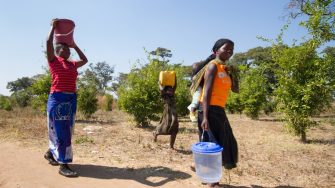- UNSW
- ...
- Humanitarian Engineering
- Global Impact Stories
- Building resilience to climate change in Tanzania
- Home
-
Vertically Integrated Projects
-
Explore VIP
- R2: Robo-re-Cycle
- Minex
- Space Power Systems
- 3D 4 Health
- 4D Immersive Surgery
- Mini Solar
- Biological Remediation
- Deep Earth Storage
- Fighting Fires with Science
- AI 4 Everyone
- Connected Health
- Mending broken hearts
- Assistive Tech Hub
- AUStronauts
- Purple House
- Flying Cars - Virtual Reality Simulator
- AtomCraft
- Sunswift Racing
- EASE – Exoskeleton for Assistive Support of Elderlies
- Sunswift Technology
- Student Information
- Benefits of Joining
-
Explore VIP
- Student Projects
-
Humanitarian Engineering
-
Global Impact Stories
- Solar freezer for remote Fijian communities
- Improving drought resistance in Uganda
- Measuring air quality in the South Pacific
- Repairing medical equipment in Uganda
- Brewing up world positive coffee
- Agricultural sustainability in Nepal
- Clean water for Sri Lankan communities
- Repairing medical equipment in Cambodia
- Building resilience to climate change in Tanzania
- Sustainable housing in Cambodia
- Empowering female entrepreneurs in India
- Making an impact in Myanmar
- Solar energy project helps remote Vanuatu villages
- Student Information
- Humanitarian Engineering Thesis Supervisors
-
Global Impact Stories
- Assistive Tech Hub
- Taste of Research
- Contact Us
- Home
-
Vertically Integrated Projects
Explore VIP
- R2: Robo-re-Cycle
- Minex
- Space Power Systems
- 3D 4 Health
- 4D Immersive Surgery
- Mini Solar
- Biological Remediation
- Deep Earth Storage
- Fighting Fires with Science
- AI 4 Everyone
- Connected Health
- Mending broken hearts
- Assistive Tech Hub
- AUStronauts
- Purple House
- Flying Cars - Virtual Reality Simulator
- AtomCraft
- Sunswift Racing
- EASE – Exoskeleton for Assistive Support of Elderlies
- Sunswift Technology
- Student Projects
-
Humanitarian Engineering
Global Impact Stories
- Solar freezer for remote Fijian communities
- Improving drought resistance in Uganda
- Measuring air quality in the South Pacific
- Repairing medical equipment in Uganda
- Brewing up world positive coffee
- Agricultural sustainability in Nepal
- Clean water for Sri Lankan communities
- Repairing medical equipment in Cambodia
- Building resilience to climate change in Tanzania
- Sustainable housing in Cambodia
- Empowering female entrepreneurs in India
- Making an impact in Myanmar
- Solar energy project helps remote Vanuatu villages
- Assistive Tech Hub
- Taste of Research
- Contact Us

Project summary
This project tackles the issue of drinking water quality in Tanzania through modelling the impact of weather and climate on remote, rural and urban community water supplies.
Project outcomes
This project is aimed at improving the understanding around the interactions of water, sanitation and hygiene (WaSH) and how it plays a key role in public health. It demonstrates that there is an emerging need for improving the resilience of WaSH infrastructure and management systems in response to climate change.
The UNSW Water Research Centre, led by UNSW Engineering A/Prof. Fiona Johnson, have completed two field projects to sample water quality and collect climate data from 2016-17 in partnership with the Ifakara Health Institute. The UNSW team successfully modelled relationships between water quality and climate variability, and how these relationships impact water quality for households.
These research findings have been given to the Tanzania Ministry of Health, Community Development, Gender, Elderly and Children, to develop effective policies for water infrastructure in Tanzania.
Location
Various districts across Tanzania
Population of 56 million
21 hour journey from UNSW, Sydney
View on Google Maps, opens in a new window
Project timeline
2016 - 2017
United Nations Development Goals
SDG 6:, opens in a new window Clean Water and Sanitation
SDG 11, opens in a new window: Sustainable Cities and Communities

